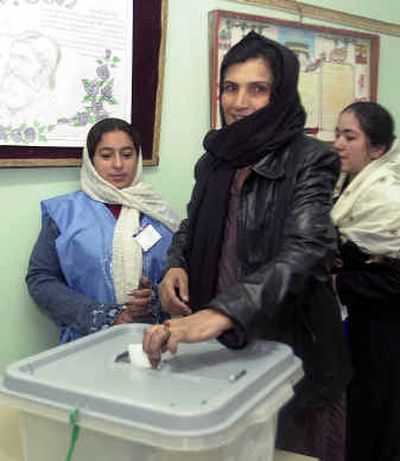Afghans vote amid threats of violence

KABUL, Afghanistan – Afghanistan’s historic presidential election began today, with people across this ethnically diverse land casting the first ballots in an improbable experiment with democracy and under a Taliban threat of ruinous violence.
After 25 years of near-constant war, voters descended on bombed-out schools, blue-domed mosques and bullet-pocked hospitals to choose their leader for the first time as more than 100,000 soldiers, police, U.S. troops and other security forces were deployed to thwart attacks.
Interim leader Hamid Karzai is widely expected to win against 15 rivals, among them warlords, royalists and an Islamic poet. But the size of the field could deny Karzai the outright majority needed to avert a run-off.
A 19-year-old Afghan refugee in Pakistan became the election’s first voter early today, casting a ballot in the Pakistani capital, Islamabad.
“I cannot explain my feelings, just how happy I am,” said Moqadasa Sidiqi, a science student whose family escaped Kabul in 1992 during civil war. “I would never have thought I would be able to vote in this election.”
Some 750,000 Afghan refugees registered to vote in Pakistan, and 400,000 to 600,000 more were eligible in Iran. Initial results were not expected until late Sunday or early Monday. Anything approaching a full count could take two weeks.
While the Taliban threat of an overwhelming attack had not materialized by early today, there were plenty of signs the rebel group was trying. On Friday, a bomb-sniffing dog discovered a fuel-truck rigged with anti-tank mines and laden with 10,000 gallons of gasoline on its way to the southern city of Kandahar.
Election officials arrested three Pakistanis and said they planned to detonate the truck in the center of the city on polling day.
“This would have caused hundreds of deaths … and the electoral process would have been derailed in the area,” said Col. Ishaq Paiman, the Defense Ministry deputy spokesman.
A flurry of rockets landed in several cities around the country Thursday and Friday, including one that hit a parking lot near the U.S. Embassy and another that injured a young girl and an old man in Jalalabad. Still, none threatened to derail the vote, and most Afghans brushed them off.
“In 25 years, a lot of rockets have landed. If another one lands because of the election, it’s no problem,” said Noor Uddin, a 49-year-old Kabul businessman, on Friday.
In Kandahar, police struggled to keep back a crowd of hundreds of men trying to vote at a polling site on the grounds of the governor’s residence. Election workers reprimanded several Karzai campaign officials for coming to lobby voters at site, a violation of electoral law.
Voters who came out early across the country said they hoped the election would put an end to this hard-luck nation’s long suffering.
“We are very happy,” said Abdur Rahim, a 75-year-old voting in the northern city of Sheberghan, a stronghold of Uzbek warlord Abdul Rashid Dostum, one of Karzai’s challengers. “We want the election to end our wars.”
Aziz Ullah, a 19-year-old Kabul shopkeeper, said the election offered a stark contrast in a nation that has endured many forms of imposed rule in the past 30 years – among them monarchy, Soviet occupation, warlord fiefdoms and the repressive Taliban theocracy ousted by the U.S.-led invasion following the Sept. 11 attacks.
“I came here to vote so we can have democracy and stability and peace in Afghanistan,” he said. “There used to only be a transfer of power by force or killing. Today, the Afghan people are choosing their future leaders themselves.”
Women voted at separate booths from the men, in keeping with this nation’s conservative Islamic leaning.
“I walked from my house with my husband to vote for Karzai, who is a very good person,” said Mahtab, a 45-year-old Kabul housewife. Like many Afghans she uses only one name.
A day ahead of the vote, Islamic clerics urged worshippers to embrace democracy. At the Blue Mosque, the capital’s largest house of prayer, Mullah Obeid-ul Rahman told some 400 faithful that Islam and democracy should go hand and hand.
Rahman did not say which presidential hopeful he would pick, but made clear that the only female candidate, former U.N. worker Massooda Jalal, was not his choice.
“In Islam, it is forbidden for a woman to become president,” he told the crowd.
Expectations for the election have been set intentionally low.
Afghans have no experience with democracy, and most say they will vote based on the recommendations of tribal elders. The country of 25 million people is largely illiterate, and voters will have to rely on candidates’ photographs and electoral symbols to figure out which box to check.